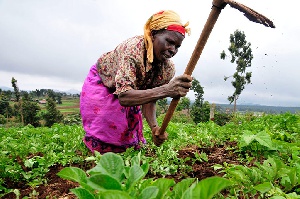Mr. Kwabena Adu-Gyamfi, Managing Director of Agri Commercial Services at Wenchi in the Brong Ahafo Region, has urged farmers -- especially vegetable growers -- to embrace greenhouse technology as a new vehicle to enhance and change their mode of farming in order to better their lot.
Adoption of greenhouse technology, he says, among other things brings change to the farming system so as to guarantee massive yield increase, quality produce, investment security and a prolonged farming season.
A greenhouse is a structure that allows for greater control over the growing environment of plants. Depending upon the technical specification of a greenhouse, key factors which may be controlled include temperature, levels of light and shade, irrigation, fertiliser application, invasion of diseases and atmospheric humidity. It can also be used to overcome shortcomings in the growing qualities of a piece of land, such as a short growing season or poor light levels, and can thereby improve food production in marginal environments.
Mr. Adu-Gyamfi made the call when he briefed the B&FT about the progress of a GH¢250,000 greenhouse technology project at Wenchi. The 18-month-project, the first of its kind in the Brong Ahafo Region, is being funded by COTVET-Skill Development Fund (SDF). The ten-tunnel project is expected to be up-scaled to serve as a guaranteed source of raw material for the defunct Wenchi Tomato Factory, which is primed to be re-opened by 2015.
The Wenchi Tomato Factory, a subsidiary of Agri Commercial Services was shut down in 2007 as a result of non-availability of the required fresh tomatoes for processing. The factory was largely dependent on out-grower farmers they had trained and supported with inputs -- but the farmers upon harvesting circumvented the factory managers for the open market.
It is estimated to cost about GH¢10.5million to breathe life back into the ‘dormant’ factory. Managers of the factory are looking at diversification including sweet-corn, mango and other fruit/vegetable-processing when it re-opens as scheduled.
“We are concentrating on greenhouss to produce the bulk of our raw materials. We anticipate producing about 2,000 tonnes from a land cover of five hectares. Though the technology is capital intensive, it’s the best that we can hope for. A 120square metre greenhouse tunnel costs about GH¢12,000.
“The knowledge-base for vegetable cultivation in Ghana is extremely low. This is driving the high prices of vegetables, particularly tomatoes, in the country. Vegetable farms are always vested with a lot of disease, thereby producing very poor and small yield,” the Managing Director said
Ghana’s tomato-consumption rate is estimated at about 400,000 metric tonnes per year, but the country locally produces only about 30% of its demand. The balance is made up with imported tomatoes (fresh, puree and paste), making Ghana one of the leading importers of the commodity in the world.
It is against this backdrop that Mr. Adu-Gyamfi believes the time has come for farmers to move away from open-air cultivation to greenhouse technology so as to boost production of tomatoes and others vegetables in the country, adding that: “We can emulate the examples of countries like Kenya and Mozambique who have been successful with the technology”.
Business News of Monday, 27 January 2014
Source: B&FT
Farmers urged to embrace greenhouse technology
Entertainment
















